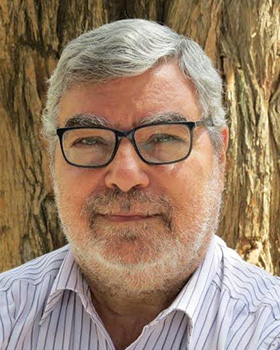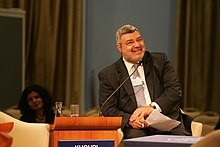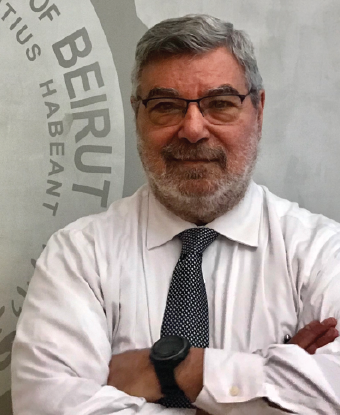
Pathbreakers of Arab America—Rami Khouri

By: John Mason / Arab America Contributing Writer
This is the sixty-third of Arab America’s series on American pathbreakers of Arab descent. The series includes personalities from entertainment, business, sports, science, academia, journalism, and politics, among other areas. Our sixty-third pathbreaker is Rami Khouri, a Palestinian Jordanian, educated in both the Middle East and the U.S. A widely respected, internationally syndicated political columnist and professor of journalism, Khouri is known for his precise, honest analyses of the global influence of the Middle East, including the hot button topics of today. In a recent interview, Khouri renders a clear-eyed assessment of the Gaza war, especially the complicated roles of Hamas, Israel, and the U.S. in reaching a ceasefire.
Understanding Middle East political development like no other journalist, Rami Khoury’s credentials are exquisite
Rami George Khouri was born on October 22, 1948, to an Arab Palestinian Christian family. He was born in New York City when his father, George, a Nazarene journalist in what was the British mandate of Palestine, had traveled with his wife to New York in 1947 to cover the United Nations debates about the future of Palestine. Khouri’s family resides in Beirut, Amman, and Nazareth. He is married to Ellen Kettaneh and they have two grown sons. He has B.A. (1970) and MSc (1998) degrees, respectively, in political science and mass communications from Syracuse University, New York.
After attending secondary school at the International School of Geneva in Switzerland, Rami Khouri returned to the U.S. to complete his education. In 1971, he began his career working as a reporter for the English-language newspaper “The Daily Star” in Beirut, Lebanon. From 1972 to 1973, Khouri continued writing columns for the paper while working as managing editor of Middle East Sketch magazine.
Following a year in the United States as program administrator for the Division of International Programs Abroad at Syracuse University, Khouri returned to Beirut to become managing editor of “Middle East Money” from 1973 to 1974. He then moved to Amman, Jordan, where he served as editor-in-chief of Jordan’s English-language daily, the “Jordan Times,” from 1975 to 1982 and again from 1987. Khoury has had a peripatetic career, moving back and forth between the U.S. and Lebanon, Jordan, and the Gulf states. His positions have been prestigious, including a Nieman Journalism Fellowship at Harvard University and a member of the Brookings Institution Task Force on U.S. Relations with the Islamic World.
In addition to teaching at the American University of Beirut, Khouri has taught or been an academic fellow at numerous American universities, including Northeastern, Villanova, Harvard, Mount Holyoke, Princeton, Syracuse, Tufts, and Stanford. In 2006, he was awarded the prestigious Pax Christi International Peace Prize, which is given to peace organizations and peace activists. Its focus is on working in an ongoing conflict aimed at fighting violence and injustice.

Khouri’s career has crisscrossed journalism and academic lines with ease. One example is his hosting “Jordan Ancient Cultures,” a weekly archaeology program on Radio Jordan. Khouri was also a research associate in the Analysis and Resolution of Conflict program at the Maxwell School, Syracuse University, and a board member of Georgetown University’s Center for Contemporary Studies. He has also written extensively for international publications, including the “Financial Times,” the “Boston Globe,” and the “Washington Post.”
A small sampling of Khouri’s publications include “The Antiquities of the Jordan Rift Valley,”Petra: A Guide to the Capital of the Nabataeans,” “The Jordan Valley: Life and Society Below Sea Level,” “Islamic Banking: Knotting a New Network;” and “For Those who Share a Will to Live: Perspectives on a Just Peace in the Middle East.”
Khouri delivers a scathing analysis of U.S.-Israel involvement in negotiating the Gaza war
In an August 26, 2004, interview with TV’s “Democracy Now!” Khouri strongly criticized the significant participants in the war. He also took the U.S. to task for its so-called peacemaking role. He says, “The ceasefire talks should not be taken very seriously as an effort to bring about a ceasefire.” “It’s pretty clear now that the ceasefire negotiations today are the equivalent of the so-called peace process in the bigger Arab-Israeli conflict over the last 40 years.”
“Democracy Now!” host Amy Goodman specifically asked Khouri about the escalation of violence on the northern border between Israel and Lebanon. He described it as “an escalation of aggression by Israel and resistance by Hezbollah. And the mutual attacks back and forth have been going on for probably the last 16, 18 years, since the 2006 war between them.” Psychological warfare is one of the aims of Israel, to put the whole country of Israel “on edge.”
Khouri avers that the war will continue “until two things happen: The Israelis get out of Gaza, and Palestinians can rebuild their lives there, and second of all, some signs of action or movement towards resolving the overall Palestinian-Israeli and Arab-Israeli conflict, some signs of that materialize, because, until then, this is going to continue. There will continue to be this antagonism by the Hezbollah and Lebanese and Syrians and Palestinians and others and Yemenis towards Israel for what it’s done in Palestine. And this has to be resolved politically. It can’t be resolved militarily.”
Further on in the “Democracy Now!” interview, Khouri defined the relationship between Israel and the United States: “They’re very close in armaments and strategy, and the U.S. now is actively, almost enthusiastically, supporting the Israeli genocide in Gaza, but Israel does what it feels it needs to do, and the U.S. doesn’t seem to be able or willing to stop it. I also think we have a similar relationship between Hezbollah and Iran. They’re very close, but Iran doesn’t command, direct Hezbollah in telling it what to do.”
Concerning the July 2024 ceasefire negotiations, Khouri characterized these as “the equivalent of the so-called peace process in the bigger Arab-Israeli conflict over the last 40 years, which also was under U.S. management or direction. And the ceasefire talks seem to be, in the eyes of most analysts and observers in the Middle East, seem to be a mechanism just to delay anything serious from happening to allow Israel to continue with its genocidal killing of — you know, the figures, the official figures, are over 40,000. Most people say it’s closer to 150,000 dead, but we’ll find that out in the future. So, the ceasefire talks are a fictitious political dynamic.”

Khouri described why he thought the ceasefire talks are fictitious—”the United States is trying to be the main driver of the peace process, to the point where Biden announced an agreement back in early July, but the U.S. is also the main funder, arms supplier and political cover provider, diplomatic protector of Israel in the U.N. and other places. So, you can’t have the one party that is the major force for letting the genocide happen, technically and politically, and at the same time claim to be a mediator that’s trying to mediate between Israel and Hamas. This is the kind of fiction and fantasy that comes out of the State Department and the White House, and most of the world just watches this on TV, thinking, ‘Oh, something might happen.’”
Khouri finally condemns the U.S. role in the ceasefire negotiations, holding back no punches. “Everybody in the Arab region has realized that this is not a serious process. This is the latest manifestation of a colonial process managed by white, Northern, racist, militant groups, countries — it used to be England, now it’s the United States — that keep playing games with the people of the region for the benefit of either the Western powers or, today, for Israel.”
So, Khouri concludes, “…the ceasefire talks should not be taken very seriously as an effort actually to bring about a ceasefire. They are better seen as an indication of the skewed relationship between Western imperial powers and Israel, which is their closest manifestation in the region, settler-colonial power — relations between them and between the Palestinians, who are standing steady…”
Khouri’s final condemnation of the U.S.-Israeli relationship became up-close and personal: “…we are not prepared to play cartoon games with people like Antony Blinken and Dennis Ross before him, and people who are not serious about the real resolution that is required to address the real core of the problem, which is the conflict between Zionist Israel and Zionism, on the one hand, and Arab — Palestinian Arabism, on the other. There is a resolution to that conflict, a peaceful resolution that can be done, just like there is a resolution in Gaza, but the Israelis don’t want to do it.”
There we have it: a crystal clear, honest analysis, as only Rami Khouri can state.
Sources:
–“Rami G. Khouri,” Wikipedia Series on Arab Americans, 2024
–“Colonial Process”: How U.S.-Led Ceasefire Talks Are Latest Erasure of Roots of Arab-Israeli Conflict, Democracy Now, 8/26/2024
–Understanding Hamas: And Why That Matters, Rami G. Khouri and Helena Cobban, Waterstones, 2024
John Mason, Ph.D., focuses on Arab culture, society, and history and is the author of LEFT-HANDED IN AN ISLAMIC WORLD: An Anthropologist’s Journey into the Middle East, New Academia Publishing, 2017. He has taught at the University of Libya, Benghazi, Rennselaer Polytechnic Institute in New York, and the American University in Cairo; John served with the United Nations in Tripoli, Libya, and consulted extensively on socioeconomic and political development for USAID and the World Bank in 65 countries.
The views and opinions expressed in this article are those of the author and do not necessarily reflect the position of Arab America. The reproduction of this article is permissible with proper credit to Arab America and the author.
Check out our Blog here!
Discover more from reviewer4you.com
Subscribe to get the latest posts to your email.





